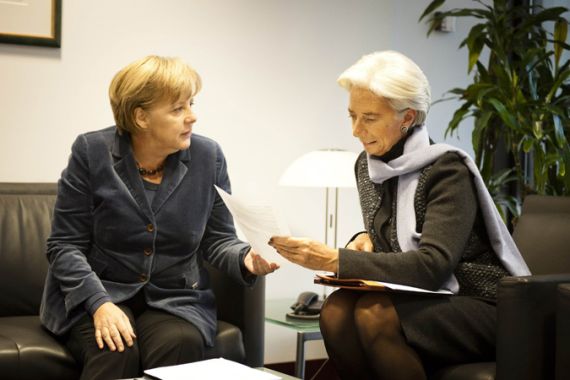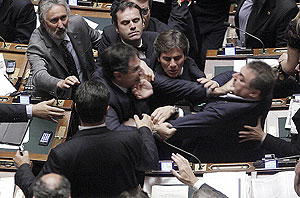EU leaders meet to thrash out debt deal
European leaders say progress made on bank recapitalisation but major sticking points remain at Brussels crisis summit.

| Al Jazeera’s Andrew Simmons reports from Athens on the eurozone debt crisis |
Jan Vincent-Rostowski, the Polish finance minister, said big European banks will be required to raise their capital cushions to nine per cent of their risky investments by June.
Earlier in the day, Angela Merkel, Germany’s chancellor, received a boost ahead of the summit when the German parliament voted in favour of plans to boost the EFSF, the $600bn mechanism set up to provide support to eurozone economies at risk of defaulting on debts
“The world is watching Germany and Europe to see if we are ready and able to take responsibility. If the euro fails, Europe fails,” said Merkel ahead of the vote.
Merkel has called for a 50 per cent write-down of Greek debt held by private sector companies including many European banks; far more than the 21 per cent loss agreed to by the private sector in July.
‘Structural reforms’
“We will do all we can to get Greece back on its feet as soon as possible,” she said, adding: “A debt write-down alone will not solve Greece’s problems … structural reforms must still be implemented.”
Greece, the region’s most troubled nation with debts of $484bn, has already implemented unpopular austerity cuts to access bailout funds from the EU and the IMF, but there are fears the crisis could spread to larger economies within the eurozone including Italy and Spain.
As the eurozone’s biggest economy, any eventual deal will likely require Germany’s backing. But Merkel needed to win Wednesday’s vote to give her a mandate to negotiate a deal with other EU leaders aimed at delivering a range of measures to stop the debt crisis from spiralling.
Europe has already bailed out three small eurozone members – Greece, Portugal and Ireland – and there are fears it cannot afford to bail out the troubled economies of Italy and Spain, the third and fourth largest economies in the bloc.
Yves Leterme, the Belgian prime minister, said EFSF would need resources of more than one trillion euro ($1.4tn) to prevent the currency union’s debt crisis from spreading.
“I think that effectively, it has to be able to intervene a good deal beyond one trillion euro,” he said before the summit.
Blunt message
Greece has been pushed out of the limelight in recent days by Italy, which is under intense pressure to implement promised austerity and growth measures.
 |
| Italian politicians exchanged blows in parliament as country faced heightened economic woes [Reuters] |
In unusually blunt terms, French, German and EU leaders told Silvio Berlusconi, Italy’s prime minister, to follow up on his reform commitments by Wednesday, in order to reassure markets.
The Italian prime minister has averted a government collapse to clinch an overnight deal on emergency growth measures demanded by the EU.
But there were scuffles in the Italian parliament as politicians came to blows over the tough economic reform programme.
Wednesday’s summit comes just over one week before European leaders have to face their G-20 counterparts in Cannes, France.
China and the US have warned European leaders of the urgency to solve the debt crisis amid concerns that failure could push the world into another recession.